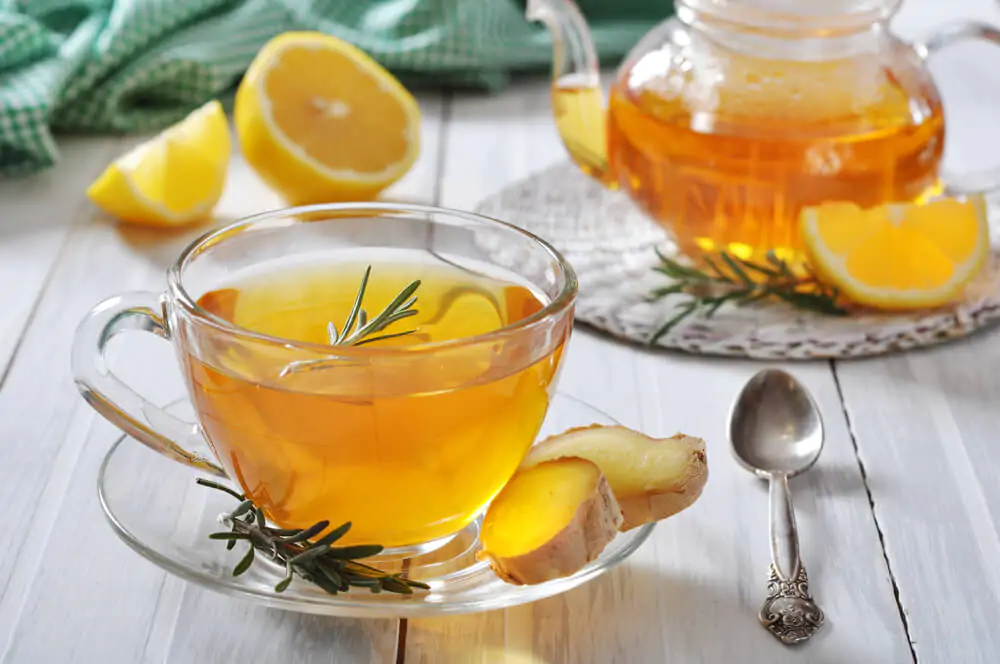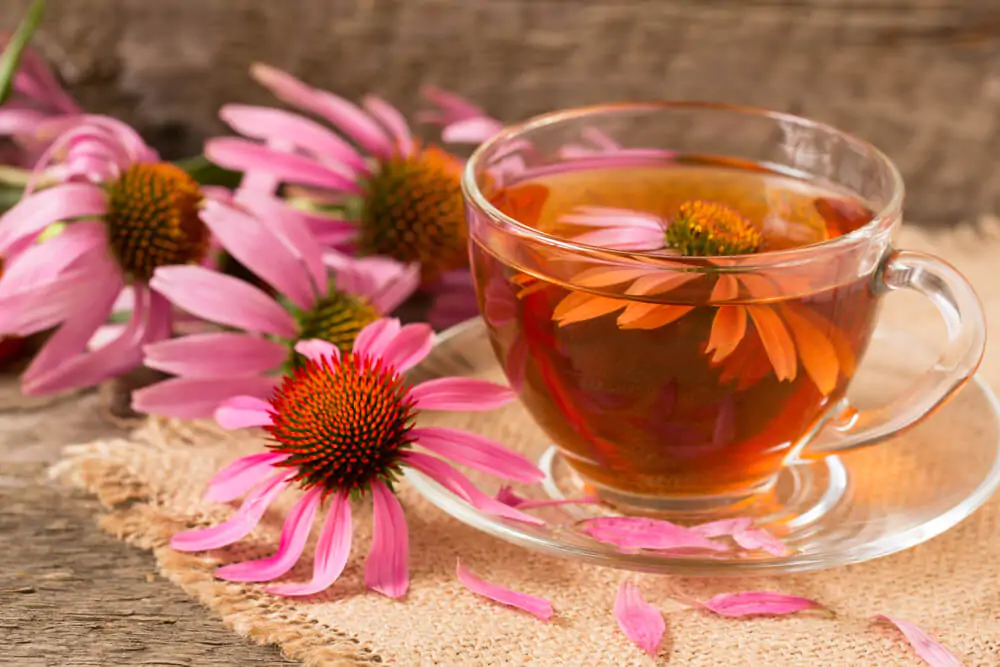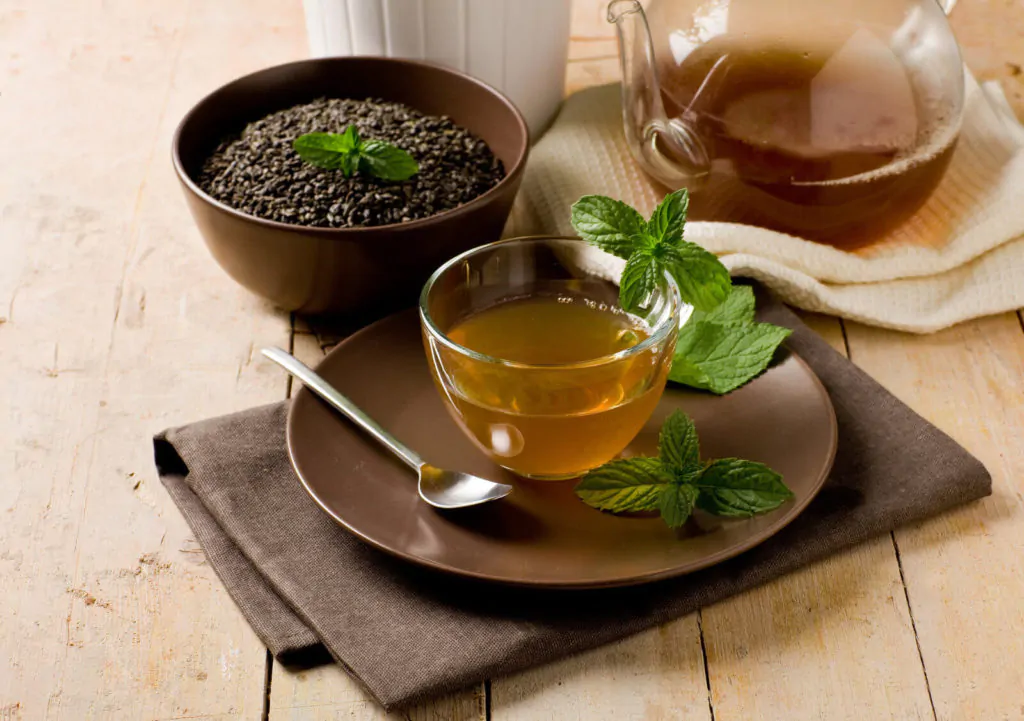Find out what tea is good for an upset stomach and what other hot beverages are recommended when you feel a little under the weather.

From the flavor of hot tea to the caffeine and health benefits, there are many reasons people choose it as part of their morning routine.
Herbal tea and green tea are even used as holistic treatments for issues such as indigestion and bloating. In fact, tea has become a renowned home remedy for treating many tummy issues.
With so many teas on the market, it’s hard to know what tea is suitable for an upset stomach. That’s where this article comes into the picture, giving you a more detailed idea of the best teas for that ailment. We will also touch on what teas are suitable for other issues, including heartburn and constipation. You might also be wondering, is coffee good for a sore throat?
- A Balanced Approach To Digestive Issues
- What Herbal Teas Are Good For Illnesses?
- 1. Lemon Tea
- 2. Chamomile Tea
- 3. Ginger Tea
- 4. Licorice Root Tea
- 5. Peppermint Tea
- 6. Echinacea Tea
- 7. Nettle Tea
- 8. Hibiscus Tea
- 9. Elderberry Tea
- 10. Spearmint Tea
- Other Types Of Teas That Can Help With Illnesses
- 1. Green Tea
- 2. White Tea
- Other Remedies
- FAQs
A Balanced Approach To Digestive Issues
If you’ve got cold symptoms or feel the flu coming on, one of the first things that a doctor will usually ask is whether you are getting enough fluids. That is because dehydration may occur if you don’t compensate for the water you lose from runny noses and sweating.
Drinking plenty of water can help speed up your recovery. And hot drinks such as herbal tea can assist, too. The warm liquid soothes your throat and helps reduce congestion.
Some of them even contain antibacterial properties that help relieve cold symptoms. Although research hasn’t established that drinking tea can completely cure a common cold or flu, there’s evidence that tea mitigates some symptoms.
Of course, as good as tea is in assisting wellness, it is not a substitute for medical assistance. If symptoms persist for any issue, you should consult a medical professional.
What Herbal Teas Are Good For Illnesses?
Since ancient days, people have used herbs as a natural treatment for different ailments. A herb such as a peppermint or licorice contains potent plant compounds that can help fight the symptoms of specific issues. Mixed with water, they transform into a flavorful tea with plenty of health benefits.
1. Lemon Tea
Sipping on lemon tea or squeezing the juice into another type of herbal tea is a home treatment that’s been popular for eons.
Citrus fruits contain vitamin C, an essential nutrient when you’re fending off a cold or flu. Not only is vitamin C an antioxidant, but it also boosts the immune system. These medicinal properties make lemon tea one of the most popular teas used for the holistic treatment of head colds.
Lemons are also used in mixtures for teas that help with the abdominal pain associated with period cramps.
2. Chamomile Tea
Chamomile tea can help you sleep: the chamomile plant leaves have flavonoids in the petals with a tranquilizing reaction.
Okay, so how does that help when you’ve got a virus? It would be best if you had extra sleep to help your body recover when you’re unwell. After all, it would be best if you were rested to become fully functional again, and this caffeine-free option can help you with that.
Chamomile tea also has anti-inflammatory properties, adding additional advantages. You might also be interested in our Ocha tea guide.
3. Ginger Tea

Ginger tea is renowned for its ability to help you fight feelings of nausea. Many people recommend it as an option to help with morning sickness during pregnancy.
Ginger is full of anti-inflammatory and antioxidant properties. Ginger also prohibits microorganisms that result from infection. Not only is it suitable for stomach discomfort, but take a sip of spicy ginger tea and watch your sore throat ease too.
4. Licorice Root Tea
Fancy something on the sweet side? Licorice root tea could be for you. A popular herbal remedy in Chinese medicine, licorice root can be used to help gastrointestinal issues and aid digestion. Licorice tea is also said to have antimicrobial and antiviral qualities to help with cold symptoms.
5. Peppermint Tea
With a distinct flavor, this minty herbal tea helps get rid of congestion and makes breathing easier. The menthol in the leaves also relieves coughs and colds. What’s more, peppermint tea can decrease body aches and inflammation.
Research by the USDA discovered: “Peppermint tea has been found to have significant antimicrobial and antiviral activities, strong antioxidant and antitumor actions, and some antiallergenic potential.” Thus, tea made from peppermint leaves is a great option, with its excellent health benefits.
6. Echinacea Tea
Echinacea is a flowering plant in the daisy family known to improve immunity and inflammation. This natural remedy has been shown to decrease the odds of developing the common cold by 58%. So, brewed as a tea or taken as a supplement, it may fight off an incoming common cold with its antiviral properties.

7. Nettle Tea
Nettle plants are rich in vitamins and minerals. Two of the most important are carotene and vitamin C. We’ve already mentioned the latter’s benefits.
The former can help your immune system and fights foreign bacteria. While the live plant causes a burning and itching sensation if you touch it, those side effects are largely absent when drinking nettle tea. Instead, it can help soothe and alleviate pain.
8. Hibiscus Tea
A study found hibiscus extract increased antioxidant enzymes and reduced the harmful effects of free radicals. Other research found additional benefits, such as fighting bacteria. Also, there are antioxidants in this flowering plant.
Steeped in hot water, this hot herbal tea has a tart flavor likened to cranberries.
9. Elderberry Tea
A key feature of this dark purple berry is its antioxidant properties. Some evidence shows that elderberry can ease sickness symptoms and boost the immune system. When made into an elderberry tea, the drink has been seen to shorten the time spent ill with a common cold or the flu.
10. Spearmint Tea
Many of the teas that are used to ease stomach pain contain spearmint. These brews are excellent for rebalancing the stomach and reducing flatulence. Not only are they a great help for stomach problems, but when boiling water is poured over them, and they are given time to brew, these teas also taste delicious.
However, you should contact your local healthcare provider immediately if you have severe stomach pains. Issues with stomach ulcers and stomach lining should be viewed by medical professionals rather than treated at home.
Other Types Of Teas That Can Help With Illnesses
In contrast to herbal tea, true teas are produced from Camellia sinensis leaves and buds. They contain caffeine, which is not necessarily advisable when you’re unwell. But true teas also offer medicinal benefits that help when you’re sick.
Continue reading for the lowdown.
1. Green Tea
Green tea contains antioxidants. Antioxidants help you say goodbye to harmful bacteria and free radicals. When you sip on a mug of green tea, coughing, and congestion can reduce.

While green tea may give you an energy boost when trying to combat a cold, it’s unclear whether it shortens a cold’s duration.
2. White Tea
White tea is packed with antioxidants. Studies have shown that EGCG (the polyphenol compound that’s found in white tea) suppresses free radicals. And it reduces inflammation, too.
White tea may also lower the risk of developing Alzheimer’s and Parkinson’s.
3. Black Tea
Black tea is said to be a soothing flu-fighting tea with antibacterial and antioxidant properties. It’s known to alleviate aches and pains and contains catechins that help you stop getting sick in the first place.
Other Remedies
To fight off a virus, there are plenty more treatments you can use in conjunction with teas.
Probiotics, zinc supplements, cough drops, throat lozenges, and over-the-counter medication if you need it. Think about the flu jab, as well. And seek help from a doctor if necessary.
From herbal teas and blends to more traditional choices, a cup of tea can help relieve the symptoms of the common cold and flu and issues with the digestive system. Hot tea is a simple home remedy that can boost your immune system, rid you of bad germs, and give you a vitamin C hit. Not to mention wrapping you in a comforting, warm hug.
The best tea will depend on flavor preference and the specific properties you’re looking for.
FAQs
What is the best tea to drink if you have a cold?
Chamomile tea and peppermint tea have long been favorites. The former boasts anti-inflammatory and sleep-aiding properties. And the latter has antiviral and strong antioxidant properties.
What is the best tea for your immune system?
Ginger, licorice root and hibiscus tea boost your immune system. Peppermint, chamomile, and green tea can also have an impact.
What should you drink when you’re sick?
Drink plenty of fluids, especially water. Herbal teas and green teas can help, too. Broth and juice are good options, as well.
Contact a doctor should your symptoms persist.
